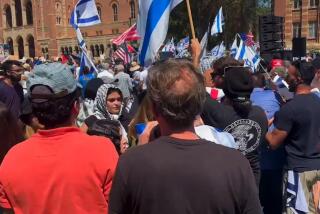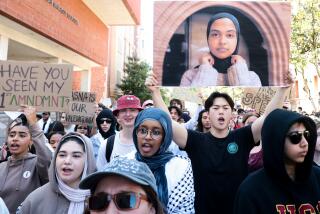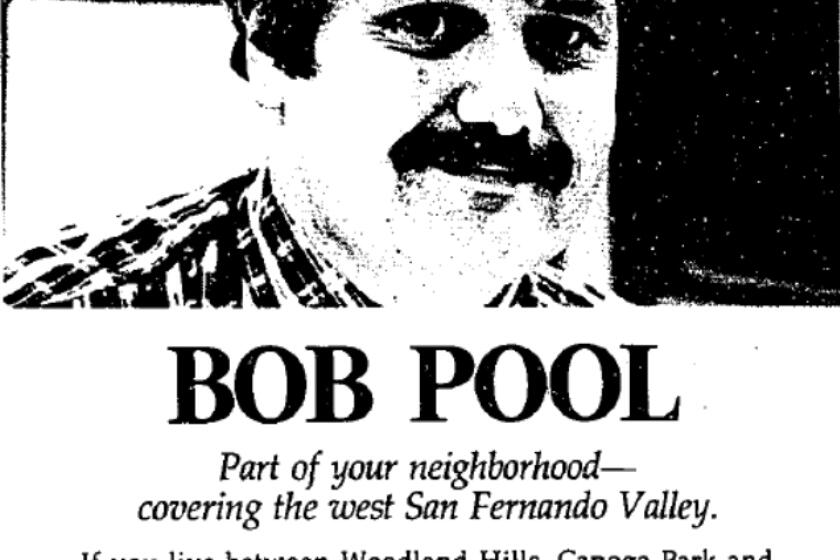Do Asian Americans Count in L.A.?
When people talk about the L.A. mayoral race, four voter blocs are almost always discussed: African Americans, Latinos, Jews, and Republicans. Yet one of the largest groups in the city is rarely mentioned: Asian Americans.
The 2000 census revealed that Asian Americans represent about 10% of the city’s population. When it takes as little as 25% of the vote for a mayoral candidate to make a runoff, 10% matters.
Additionally, Asian American voters in California are increasingly showing a partisan orientation, moving into the Democratic column. From the late 1990s to the present, national and statewide Democratic candidates have been beating Republicans among Asian Americans by a 2-to-1 margin. Even in nonpartisan L.A. mayoral races, Asian Americans picked favorites, supporting Mike Woo in 1993 and James K. Hahn in 2001.
So, if they have the numbers and are showing signs of group voting, why aren’t they more prominent in the power equations of city politics?
Citizenship and voting rates among Asian Americans are part of the problem. They may represent 10% of the population, but Asian Americans make up only around 6% of the city electorate. But that cannot be the whole answer, because even a 6% bloc that makes a clear choice in big races should be a factor.
One reason for their low political profile is that, district by district, Asian Americans in Los Angeles lack opportunities to win elective office or to control who does win. And yet this is the level where leverage is created and issues that build a constituency get articulated. Los Angeles election districts are simply too big and Asian Americans are too scattered to get a foothold.
There are 15 City Council districts in Los Angeles, each with about 230,000 residents. Latinos account for a significant share of the population in half a dozen districts; African Americans hold voting majorities in three; Jewish voters are concentrated in several Westside and Valley districts; and Republicans are numerous in the northwest and eastern Valley.
By contrast, Asian Americans are numerous everywhere, but dominant nowhere. Even Koreatown has a majority Latino population. And because neighborhoods with lots of Asian Americans are divided geographically from each other, they cannot be easily combined into one or two council districts. That means Asian American candidates are most likely to emerge in heterogeneous districts. Mike Woo was elected to the City Council from the old 13th District, including Hollywood, where no blocs dominated. Woo had a quality that Asian Americans must cultivate to solidify their clout -- crossover appeal.
The role of demographic concentration can be seen in comparing Asian American political prospects at the state level with the situation in Los Angeles. There are eight Asian Americans in the state Assembly, five Democrats and three Republicans. Most of them represent districts with higher shares of the Asian American population than Los Angeles, such as San Francisco, Monterey Park and Garden Grove, and they are more likely to represent suburban than urban areas. Of course, even in these races Asian American candidates must build crossover coalitions.
One way to jump-start Asian American electoral success in L.A. would be to create smaller City Council districts or separate boroughs, with their own elected councils, but such ideas may never materialize. More immediately, the city’s new neighborhood councils provide leadership opportunities with a real electoral future, and these positions could supplement current Asian American civic participation as public employees, community activists and members of city boards and commissions.
The more Asian Americans who get elected, the more the population will have a political focus. With that may come even more voting and wider citizenship efforts in a reinforcing cycle that can make Asian Americans a major force to be reckoned with in Los Angeles politics.
More to Read
Start your day right
Sign up for Essential California for news, features and recommendations from the L.A. Times and beyond in your inbox six days a week.
You may occasionally receive promotional content from the Los Angeles Times.


![Stephanie Lazarus, a Los Angeles police detective charged with capital murder in the 1986 slaying of her ex-boyfriend's wife pleaded not guilty during her arraignment in Los Angeles Superior Court Monday morning, July 6, 2009. (AP Photo/Al Seib ,Pool)]](https://ca-times.brightspotcdn.com/dims4/default/189ca94/2147483647/strip/true/crop/2400x1605+0+76/resize/320x214!/quality/75/?url=https%3A%2F%2Fcalifornia-times-brightspot.s3.amazonaws.com%2F65%2Fe0%2F8228b5b44c0da5be07c48647ce71%2Fdetective-killing.JPEG)



